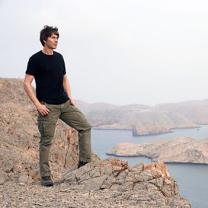The Planets
The Planets

-
Premiered:
- Network: BBC2
- Category: Series
- Genre: Documentary
- Type: Live Action
- Concept:Five-part series presented by NOVA
- Subject Matter:
- Tags: science, astronomy
Plot Synopsis
Presented by Professor Brian Cox, THE PLANETS is a five-part series that uses data from the latest space explorations, along with CGI, to reveal the beauty and grandeur of each planet in our solar system. THE PLANETS had its U.S. premiere on Wednesday, July 24, 2019 from 8-10pm, as PBS debuted back-to-back episodes. The five installments include:
"Inner Worlds" (U.S. Premiere on Wednesday, July 24 at 9pm): The four planets closest to the sun, known as the rocky planets, were born around the same time and from the same material. Yet today they are shockingly different. Tiny Mercury, with its outsize metallic core, swiftly orbits the sun almost like a moon. Venus is a devilishly hot world with a crushing atmosphere. Mars is a dusty, red desert world marked by the remnants of rivers and waterfalls. And then there's Earth, with the perfect conditions for life to thrive. But why only here? And how long will it last? NOVA takes you on a dramatic journey through space and time to discover how the fates of the rocky planets diverged, and what it might take for life to arise somewhere else. It may be that the next host of life in our solar system isn't a neighbor at all, but a distant moon of Saturn.
"Mars" (U.S. Premiere on Wednesday, July 24 at 10pm): Billions of years ago, the Red Planet was a vibrant blue water-world studded with erupting volcanoes. A vast ocean covered much of the young planet's surface, and water plunged over 13,000-foot cliffs at Echus Chasma, a deeply etched, canyon-like system still visible today. But Mars is relatively small, and its core cooled quickly, shutting down its magnetic field. As its atmosphere dwindled, Mars was exposed to the wrath of the sun, losing its water to space and becoming the frozen desert planet we know today. But scientists wonder, if Mars once had many of the elements necessary to form life -- water, volcanic activity, and a protective atmosphere -- how far into the process might it have gotten? Future missions to Mars will explore the planet's varied past and potentially answer the ultimate question: Did life ever form on Mars?
"Jupiter" (U.S. Premiere on Wednesday, July 31 at 9pm): With stunning bands of swirling gas, and its iconic Great Red Spot, Jupiter is a marvel to behold. But this marble-like gas giant -- the largest planet in the solar system -- has a dramatic past. As a young planet, Jupiter went on a rampage through the solar system. As it sped inward toward the Sun, its massive gravitational force hurled debris into interstellar space, stunting the growth of would-be planets. Earth might have been doomed had Saturn not pulled Jupiter back. But it also shaped life on Earth, delivering comets laden with water -- and perhaps even the fateful asteroid that wiped out the dinosaurs. Today, Jupiter resides in the outer solar system, where its gravity bends the paths of asteroids and stokes volcanic activity on its moon Io. But could it one day wreak havoc on its fellow planets again?
"Saturn" (U.S. Premiere on Wednesday, August 7 at 9pm): Nearly a billion miles from the Sun lies perhaps the most captivating and beloved planet: Saturn. Over the past 40 years, a handful of space probes has given us glimpses of this gas giant, relaying tantalizing discoveries like a massive hexagonal jet-stream that caps its north pole. But it was NASA's Cassini, which toured Saturn's realm for 13 years, that delivered the most astounding new insights. Saturn's icy rings -- about 45,000 miles wide and only 30 feet thick -- turn out to be younger than the dinosaurs, raising questions about their origins. Could they be the remnants of a moon ripped apart by Saturn's gravity? NOVA takes you inside Cassini's epic journey as it makes its most stunning discovery yet: geysers of ice and gas on the moon Enceladus show that it could have all the ingredients for life. But to protect it, Cassini's team must make a bittersweet decision.
"Ice Worlds" (U.S. Premiere on Wednesday, August 14 at 9pm): Beyond the rocky inner planets and the gas giants lie the ice worlds. At over a billion miles from the sun, Uranus and Neptune intrigue scientist from afar. Some 30 years ago NASA's Voyager 1 & 2 journeyed to this bizarre realm, revealing that Uranus is tipped on its side, and Neptune is enveloped by supersonic winds. Pushing further, New Horizons conducted the first flyby of Pluto in 2015. Its dazzling images revealed Pluto's jagged ice mountains and an underground ocean that changed everything scientists thought about the beloved dwarf planet. Now, NOVA takes you inside the missions that rewrote the story of the outer solar system.
Cast
Production & Distribution
- Produced by BBC Studios
- Produced by Open University

